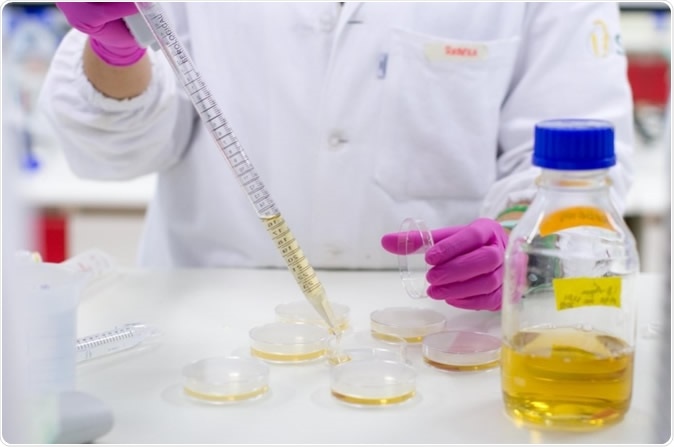A new international collaboration reports that the compound called TCMDC-135051 is capable of preventing the synthesis of a protein that is required for growth in Plasmodium falciparum, one of the species of the Plasmodium parasite that causes malaria. The study, reported in the journal Science, could lead to the development of a new antimalarial drug.

Plasmodium falciparum 3d illustration - Illustration Credit: sciencepics / Shutterstock
The compound inhibits the activity of a parasitic enzyme called protein kinase which regulates RNA splicing, and is fundamental to the activity of almost every process within the cell. At the same time it does not affect the human form of the enzyme, which would preclude its use as a drug.

Compound inhibits key enzymes, interrupting the parasite's lifecycle in human organisms and preventing transmission to vector insects. Image Credit: CQMED
Clearing out the parasites
Malaria takes a heavy toll on human life, with almost 500,000 deaths and over 200 million new cases a year. Many drugs have been devised to deal with the parasitic infection, but resistance develops quickly in most cases. However, in the case of TCMDC-135051, it affects P. falciparum’s cyclin-dependent-like protein kinase PfCLK3 which is a vital enzyme in its lifecycle. It does this without affecting the human protein kinase. The plasmodial parasite goes through both asexual and sexual phases in its lifecycle. With the asexual mode of reproduction it is able to proliferate and spread to other cells within the body. In the sexual phase it forms gametocytes which can get back into other mosquitoes to complete its development and infect other human beings.
Researcher Paulo Godoi says, “Inhibition of PfCLK3 affects the parasite in both the asexual stage of its development, when it proliferates in human cells and causes symptoms, and the sexual stage, when it can be transmitted back to the vector insect, repeating the cycle by infecting other humans.” The compound’s other effects were also explored to gain a sound understanding of how it works.
How they did it
The project was stimulated by the need to develop new drugs which can work in new ways to stop the spread of the parasite from mosquitoes to humans and to treat the disease itself, because the malarial parasite is notoriously rapid in developing resistance. Prior research by the same researchers had produced a list of 36 protein kinase enzymes that are required for the parasite to replicate itself in the blood cells. Among these, they now selected a PfCLK3 inhibitor as the target compound, since it was a small molecule and played a key part in regulating cell processes. The study involved screening almost 25,000 compounds using high-throughput assays to identify molecules with selective inhibition of PfCLK3. The researchers found that TCMDC-135051 was the most selective and powerful of all the screened molecules.
The new compound could be developed into an extremely potent killer against malarial parasite Plasmodium falciparum due to its ability to arrest the development of the parasite at all stages, whether the blood schizont, the liver schizont or the gametocytic stages. This occurs because it prevents the splicing of RNA, which carries genetic information out of the nucleus into the cytoplasm; by stopping this, the new compound prevents the production of protein from the parasite’s genes. In this way, the compound could be developed into a drug to inhibit the spread, prevent infection, as well as cure the disease itself.
In addition, early findings also indicate a possibility of being able to treat malaria caused by other species of Plasmodium as well, since in vitro activity was observed against the CLK3 enzyme in the cell cultures derived from Plasmodium vivax, Plasmodium knowlesi and Plasmodium berghei. Following this observation, they tested the inhibitor in mice with Plasmodium berghei infection, and this showed that in just five days there were no detectable parasites in the bloodstream.
Safety first
The work was also shared with researchers at University of Campinas's Center for Medicinal Chemistry (CQMED-UNICAMP) in São Paulo State, Brazil. This was in order to rule out any interference with human cell replication by the interaction of this new molecule with human protein kinase enzymes. The human counterpart with the greatest similarity to Plasmodium falciparum's PfCLK3 is PRPF4B. The CQMED team was already engaged in studying the functions of this enzyme, so it was natural that they should be asked to certify the safety of this molecule. They incubated the PRPF4B enzyme with increasing concentrations of the novel molecule, and found that at no level was it able to inhibit the human enzyme, being a hundred times less active against human protein kinase.
With the initial safety test having been passed, the researchers plan to work on modifying the molecule still further to make it still safer for human use. They foresee a 3-5 year gap before the next step of conducting a clinical trial in humans can be taken.
Source:
Journal reference:
Validation of the protein kinase PfCLK3 as a multistage cross-species malarial drug target, Vol. 365, Issue 6456, eaau1682, DOI: 10.1126/science.aau1682, https://science.sciencemag.org/content/365/6456/eaau1682